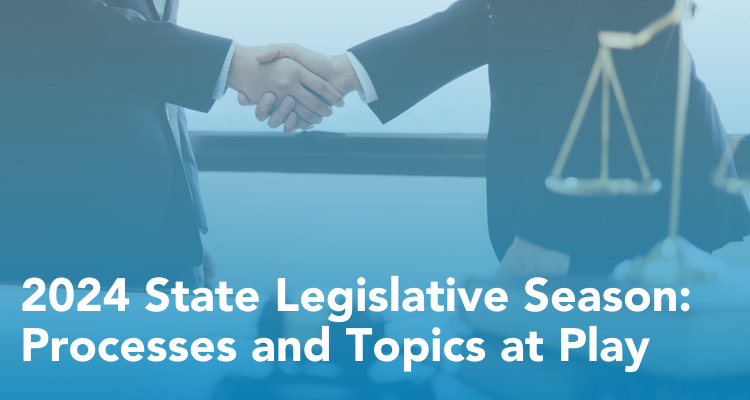It’s a new year, and 46 states, as well as the District of Columbia, started their 2024 legislative sessions. Montana, Nevada, North Dakota, and Texas only meet every other year. As usual, volunteers in CAI’s state legislative action committees (LACs) are hard at work advocating on behalf of the more than 75.5 million Americans living in community associations. By monitoring state legislation and educating lawmakers, LACs protect the interests of the community association housing model.
The length of each state’s legislative session varies. Florida and Virginia meet 30 to 60 days a year, while Massachusetts and Michigan meet year-round. While some states will introduce legislation once their sessions begin, bills in many state legislatures are pre-filed in the weeks leading up to their session being formally convened. This streamlines the legislative process by allowing more time to draft bills and consider which committee they will be referred to, according to the National Conference of State Legislatures.
Once a bill is introduced, it is heard in its committee and chamber of introduction. According to Statescape, a number of states have codified a crossover deadline, meaning a bill must pass from one chamber to another for it to continue to be viable for consideration during a given year’s session. CAI’s LACs track these crossover deadlines to ensure legislation impacting community associations is moving forward and legislation they are opposing is being held. Each state also has a bill signing or vetoing deadline that gives a due date of when a governor must take action on legislation.
More than 30 states convened their legislative sessions for 2024. Here are highlights of bill topics introduced to date in a selection of states impacting community associations:
- Alaska: regulating alterations of planned community units
- Arizona: flagpole and flag regulations; annual meeting procedures
- Colorado: community association manager licensing; landscaping practices
- Florida: association fining process; association database; estoppel certificates
- Georgia: land transactions in community associations; community association study committee
- Hawaii: dispute resolution; board rules and regulations
- Illinois: parking regulations
- Indiana: beekeeping regulations
- Kentucky: Planned Community Act updates
- Maryland: reserve study and funding regulations; solar regulations; manager licensing
- Missouri: homeowner bills of rights; Association chicken regulations
- Mississippi: covenant amendment processes
- Nebraska: solar regulations; political sign regulations
- New Hampshire: condo board meeting procedures; special assessments in condos; condo assessment liens
- New Mexico: condo owner-occupied percentage requirements
- New York: association ombudsman office; building inspections; taxation of associations
- Oklahoma: association document retention
- South Carolina: short-term rentals; amateur radio
- South Dakota: firearm regulations in associations
- Utah: solar regulations; short-term rentals
- Virginia: resale disclosures; reserve studies and funding; conservative landscaping
- Washington: amending and updating the Washington Common Interest Ownership Act
We encourage you to bookmark CAI’s legislative tracking map, ensuring you’re up to date on all legislation introduced across the U.S. impacting community associations.
You can be part of this process by becoming a CAI Advocacy Ambassador. These individuals spend a few hours a month recruiting, organizing, and motivating other advocates while supporting their state’s CAI LAC. If an advocacy issue arises in your area, you’ll be called upon to help get the word out, so CAI has a stronger voice with legislators.
Learn more about 2024 state legislative trends impacting community associations. If you’re interested in getting involved in CAI’s legislative and advocacy efforts, please get in touch with CAI’s Government & Public Affairs team at government@caionline.org.



